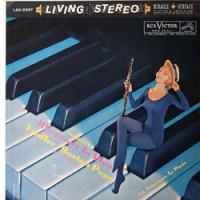Analogue Productions' Rhapsody In Blue/American in Paris "Living Stereo" Reissue Beats Original
It came to Gershwin all at once during a train ride from New York to Boston where he heard it—even saw it on paper—in a single lightning flash. So perhaps its only appropriate that this version with Earl Wild backed by Arthur Fiedler conducting The Boston Pops should be considered by many to be the best "Rhapsody in Blue" on record.
Not everyone loves Earl Wild's rapid-fire approach, finding that it goes from fast to faster and never takes a rest but having heard dozens of recordings including some that just turn what is supposed to be young, swaggering and grand into a pomposity that misses the point, even if this one's faster than ideal it still hits every mark on its way to a dramatic, thundering conclusion.
Between this one and Bernstein's on Columbia (MS 6091) that Speakers Corner just reissued, you've got "Rhapsody In Blue" and "An American In Paris" covered. Ironically both Columbia and RCA recorded their versions in 1959 and issued them around the same time early in the stereo era.
I grew up listening to the Bernstein, wherein he plays piano and conducts the Columbia Symphony Orchestra (he conducts the New York Philharmonic in the "American In Paris") and while the Bernstein may be a bit more elegant and dramatic, there's something more playful and young sounding about the Fiedler version that gets me every time.
Both "American In Paris"'s are equally enjoyable and it's another piece that sets the mind's eye wandering, this time through cobblestone streets and into cozy cafes. If you don't see Gene Kelly and Leslie Caron dancing, well then you just haven't seen the movie. Its musical impressionism has been endlessly copied most obviously for '60s rockers by the arranger of the orchestral parts of The Moody Blues' Days of Future Passed.
The "Living Stereo" 3-track recording by the legendary Lewis Layton at Boston's Symphony Hall on May 13th and 14th 1959 has always sounded somewhat distant and murky, particularly the "Rhapsody….", though in my opinion the murk only added to the mystery while not interfering with the musical pleasure.
This reissue cut by Ryan K. Smith from the original 3 track beats every original I have (four) in every way. It peels back layers of murk without adding brightness or spotlighting or anything bad.
Instead it's as if layers of dust and dirt have been expertly cleaned away revealing a fresh, clear window onto the live musical event.
No doubt for younger readers the recording date more than 50 years ago has got to sound moldy but trust me, this sounds more "you are there" than most recordings done today. Wild's piano has never sounded as cleanly rendered or as well-focused. You'll see it as clearly as the skyscrapers. The finale has never packed such a ferocious wallop either.
I went back and played the Columbia, which was produced by John McClure and engineered by Fred Plaut better know for engineering Kind of Blue among other jazz classics and Frank Bruno at the St George Hotel, in Brooklyn, New York, sounds as if it was recorded in far smaller space, which it was. It's more closely miked, which lets you better hear the parts but at the expense of the giant whole. It's also EQ'd a bit harder in the upper midrange but overall it well-compliments the RCA release both musically and sonically.
With records like this coming out, audiophiles who declare flatly that reissues never sound as good as originals skate further and further onto the thin ice.
If you intend to own but a single classical record in your collection, make it this one.



